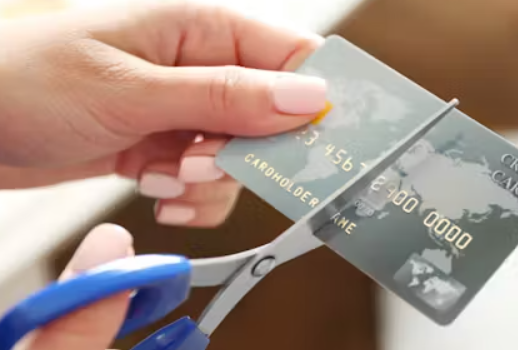
With increasing living costs and inflation, many Canadians find themselves relying on credit cards more than ever. While credit cards can be a lifesaver in tough financial times, managing them can sometimes feel like a double-edged sword. If you’ve found yourself wondering whether cancelling a credit card will harm your credit score, you’re not alone. Here’s a breakdown of how closing a credit card can impact your credit score and some important considerations before you take that step.
What Happens If You Cancel a Credit Card with an Outstanding Balance?
First and foremost, it’s important to understand that cancelling a credit card with an outstanding balance is never a good idea. While it may stop automatic payments from being charged to your card, it can lead to a series of complications. For example, you will no longer be able to make payments using that card, and failing to provide an alternate payment method for any recurring charges could result in late fees or additional penalties.
Moreover, cancelling a card doesn’t erase the debt you owe. The balance still exists, and it remains your responsibility. If you were hoping that cancelling the card would automatically clear the debt, unfortunately, that’s not how it works.
The Consequences of Cancelling a Card with a Balance
There are two key consequences to consider when cancelling a credit card with a balance still owing. First, once the account is closed, your minimum monthly payment obligations may be altered. Credit card companies typically do not close accounts with outstanding balances; they might reduce your credit limit to zero or restrict the ability to charge new purchases, but the account will remain open until the debt is fully paid.
Second, cancelling the card will negatively impact your credit score. Your credit score is partly based on your credit utilization ratio, which is the amount of credit you’re using relative to your available credit. If your card has a $5,000 limit and you owe $3,500, your utilization is 70%. After cancelling the card, your limit will drop to zero, and your utilization rate will skyrocket to 100%. This could significantly lower your score.
Will Closing a Credit Card with a Zero Balance Affect Your Credit Score?
This is a common question, and the answer isn’t simple. Closing a credit card with a zero balance can affect your credit score, but whether it’s positive or negative depends on your individual situation. When you close a paid-off credit card, it reduces your available credit, which can increase your overall credit utilization ratio. This increase in your credit utilization can lead to a temporary dip in your credit score.
Furthermore, if the card you’re closing is your oldest account or your only revolving credit account, it could affect the length of your credit history. The longer you’ve had credit, the better it is for your credit score. If you close your oldest account, you might lose some of the positive history associated with it.
Should You Cancel a Credit Card After Paying It Off?
Once your credit card is paid off, you have the option to either keep it open or cancel it. Keeping the card open can help maintain a healthy credit utilization ratio, as long as you use it responsibly. You don’t need to use the card frequently, but you should make sure it remains active by occasionally using it for small purchases and paying off the balance each month.
If you’re worried about the temptation to overspend, you can store the card in a safe place and only use it for minor, necessary expenses. By doing this, you’ll keep your credit file active and continue to build a positive credit history.
On the other hand, if you have multiple credit cards and some are no longer needed, cancelling the ones you don’t use can help you stay disciplined with your spending. If you plan on applying for a loan or mortgage in the near future, keeping only the cards you actually use might be a good idea. Too much available credit can make it harder to borrow more in the future.
Using Credit Wisely to Maintain a Healthy Credit Score
Ultimately, your credit score is influenced by how responsibly you manage your credit. Paying off your balance in full each month is always the best approach, as it demonstrates to lenders that you can manage credit without relying on debt. However, if you do carry a balance, make sure to keep it manageable and avoid maxing out your credit cards. It’s also important to regularly check your credit report to spot any errors or fraudulent activity.
To maintain a healthy credit score, aim to:
- Make payments on time.
- Keep your credit utilization ratio low.
- Avoid opening too many new accounts in a short period.
By following these guidelines, you’ll be able to make informed decisions about your credit cards and ensure that your credit score remains in good shape.
Conclusion
Cancelling a credit card can have both positive and negative impacts on your credit score, depending on your individual circumstances. It’s important to consider how closing a card might affect your credit utilization ratio and your credit history before making any decisions. If you’re unsure about whether to cancel a credit card, weigh the pros and cons and consider how it fits into your long-term financial goals.









